Saint Arnold Janssen:
The Eucharist is the spiritual depth of the Society
Fr. Arnold Janssen’s missionary spirit was in its essence profoundly Eucharistic, with the central focus on the Holy Mass at the heart of everyday life. It originated in the example of his mother who never missed daily Mass without reason. She said: “If I had not gone to Mass, I would never have been able to finish my work….” During the Mass Fr. Arnold beseeched the grace to be a faithful and useful servant of God. Entering the church, he headed first to the altar of the Blessed Sacrament, remaining for a long time before the tabernacle. Most of all, he treasured the tremendous value of the Mass by assisting willingly in other Masses, and neither the weariness of the frequent journeys nor the pain of sickness could induce him ever to omit this daily Mass. His Love of Christ present in Eucharist was expressed in many devotional practices of the time, such as frequent visits of the Blessed Sacrament, Eucharistic processions, expositions and benedictions, the Forty Hours devotion, the Holy Hour, and nocturnal or perpetual adoration before the Sacrament. Fr. Arnold shared the theological understanding of Eucharist of that time primarily as a means of grace (Matthias Scheeben) but also stressed participation in the life of the Holy Trinity.
Fr. Arnold celebrated many Masses for Bishop Anzer. He also attempted to establish a special perpetual Mass in the national shrine of Fulda for the religious unification of Germany and the conversion of the infidels. He would take time before making crucial decisions like giving first assignments to the newly ordained priests, asking the Holy Spirit for enlightenment during the Holy Mass. Their names written on paper were put under the corporal while offering the Mass. Many were impressed by his great devotion to the celebration of the Holy Mass. Fr. Vaske recalled a beautiful prayer he frequently recited during his customary half-hour Thanksgiving after the Mass: “Dear Jesus, you have come to me, and I embrace you fondly, abide, beloved, in my heart. From me never more depart.” [AN-SVD/42, no. 379] After the morning Mass, Fr. Arnold was more generous with permissions which otherwise were difficult to obtain.
Fr. Arnold regarded the Holy Mass as the principal and the noblest task of a priest for the whole day. He called priests the chosen sons of the Holy Spirit (Const. 1885, 330). “The eternal Word descends on their hands day after day and passes through them to their hearts and those of others.” In Eucharistic conferences for priests, he would frequently refer to Le Prêtre è l’Autel (1853) by Fr. Pierre Chaignon SJ (1791-1883) who gave three hundred retreats to the clergy of the main dioceses of France within thirty years. For Fr. Arnold Janssen the Eucharist was integrally intertwined with the adoration of the Blessed Sacrament, hence, from the very beginning, he planned to introduce in Steyl the adoration of the Blessed Sacrament for the members of the Mission House. Eventually, his deep wish to have perpetual Eucharistic Adoration for mission came true in the foundation of the Adoration Sisters in 1896, which he called the secret weapon for success. In Steyl there were practices of weekly night adorations on Thursdays and Fridays, and days of private expositions of the Blessed Sacrament for the special intentions “great petitions” of the Society (Remembering AJ, AN-SVD/42, no. 464, 685, 708, 815). Personally, “In the evening, before I go to bed, I have the custom of making one final visit before the Blessed Sacrament during which I remember all of our houses and missions.” (AN- SVD/97, no. 114) Fr. Arnold, encouraged all his followers to make each day a “eucharistic day” since the Eucharistic sacrifice is the source of all graces and blessings for the missionary endeavor.
Excellence of the Eucharistic Sacrifice
For Fr. Arnold, the Eucharist wasn’t a single moment of the day, but he lived the Eucharist constantly as the genuinely divine sacrifice that makes us participants in the Divine nature, in the body of Christ, and fills us with divine life (Scheeben). Fr. Arnold was deeply attracted by this miraculous and permanent presence of Christ in the consecrated Host which he approached with respect, worship, and adoration. He saw in the Eucharist the presence of a real man and God, of Christ who dies daily in the holy and bloody sacrifice of the altar in virtue of the consecration as the continuation of his incarnation. It is the “divine sacrifice of the New Testament, in which the bloody sacrifice of Calvary is commemorated and renewed.” (Const. 1891/V-11). Any fruitful mission work is co-participation in this sacrifice of Christ. “During the Eucharist, I, together with Christ will offer all my sufferings, difficulties, and whatever God sends me to the Father and the Holy Spirit, the giver of life.” He wrote to Fr. Vormann: “I strive daily at Mass to offer myself with our Savior to the Father as a sacrifice. And then when sufferings come, I try to embrace and kiss them and thank God for them. In that way, they become less heavy and, I hope, more meritorious, and can come to an end sooner. Please try to go and do likewise.” (letter of 18.08.1903) Fr. Arnold called his sons to unite with the sacrifice of Jesus Christ which reconciles, inflames, quickens and strengthens. “The privilege to consecrate, to touch and to taste daily the Body of Christ in the Eucharist is a motive, especially for the priests, to live in holiness and in the purity of life.” (Const. 1885F/149)
Trinitarian Eucharistic Throne
The Eucharist is a miraculous gift of the Holy Trinity, a special presentation of Love of the Divine Savior. The Founder´s Trinitarian view of Eucharist is characterized by the idea of the three thrones of the Trinity: the heavenly throne, the Eucharistic throne, and the mystical throne (Const. 1891/V-14). On the Eucharistic throne, Fr. Arnold adored the Word of God in connection with the Father and the Holy Spirit; the Divine Word gives itself as food to a soul for broader participation in the divine life (Statutes 1876/6); to nourish and to sustain the indwelling of the Trinity within us. In the mystery of the Eucharist, the Triune God´s love is manifested in its fullness. “With full joy over this great love of the Lord for us, we should honor the tabernacle, which is the throne of God, who has humbled himself for us, so that we devote our inner love for him who loved us first.” (Const. 1891 and 1898/V-12).Fr. Arnold highlighted the decisive role of the Holy Spirit in this sacrament and recommended all to pray for greater knowledge, love, and glory of the Divine Paraclete (Rule 1898/11). The Friday Masses in the Society were to be offered with the intentions of the Sacred Heart of Jesus and the Monday Masses in honor of the Holy Spirit to beseech graces for the Society and its mission. The Constitution 1885/129 states: “Above all, let the confreres not neglect, when the Most Holy Sacrament is exposed, to most humbly offer adoration to the Divine Word and to remember that together with the Son, the Father and the Holy Spirit are indivisibly united and therefore must be adored with him in the most Holy Sacrament.” Arnold stressed the presence of the whole Trinity in the Blessed Sacrament and the human soul through grace. The Adoration of the Blessed Sacrament is to be a source of real joy by adoring the Divine Word and the two other persons of the Holy Trinity.
The Eucharistic Day
Fascinated by Christ´s unique Eucharistic presence as a most beautiful gift and treasure of the Church to be loved, Fr. Arnold encouraged all his followers to make each day a “eucharistic day” since the Eucharistic sacrifice is the source of all graces and blessings for the missionary endeavor. During the Eucharist, we receive the most precious inspirations. We need this Divine food daily, and we should do everything possible not to weaken this life by sin to receive the Holy Communion with joy and love guarding ourselves against its unworthy reception (Const. 1891/V-10). In the Eucharist, Jesus gives us the example of obedience, humility, and sacrifice and he invites us to contribute for the sanctification of men and the glorification of God. The Const. 1885 explicitly prescribed the daily Mass for confreres “The confreres who are not priests should attend at least one Mass daily. When it is possible, the priests should also offer Mass daily.” (Const. 1891/IV-2) Thus the Eternal Word together with His assumed humanity will be adored in the sacrifice of Mass. Ultimately, the daily Eucharist means spiritual depth for the Society and is the source of strength in our mission service.
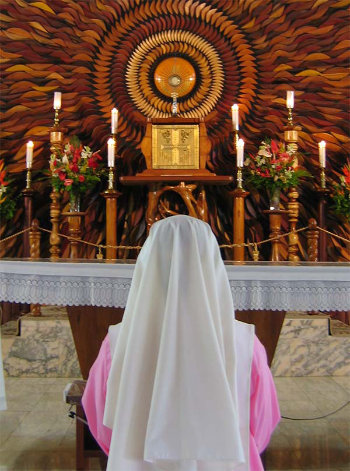
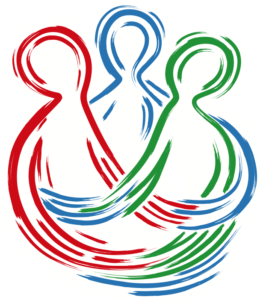
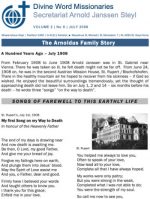
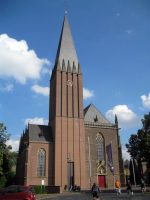
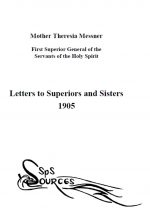

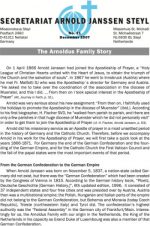
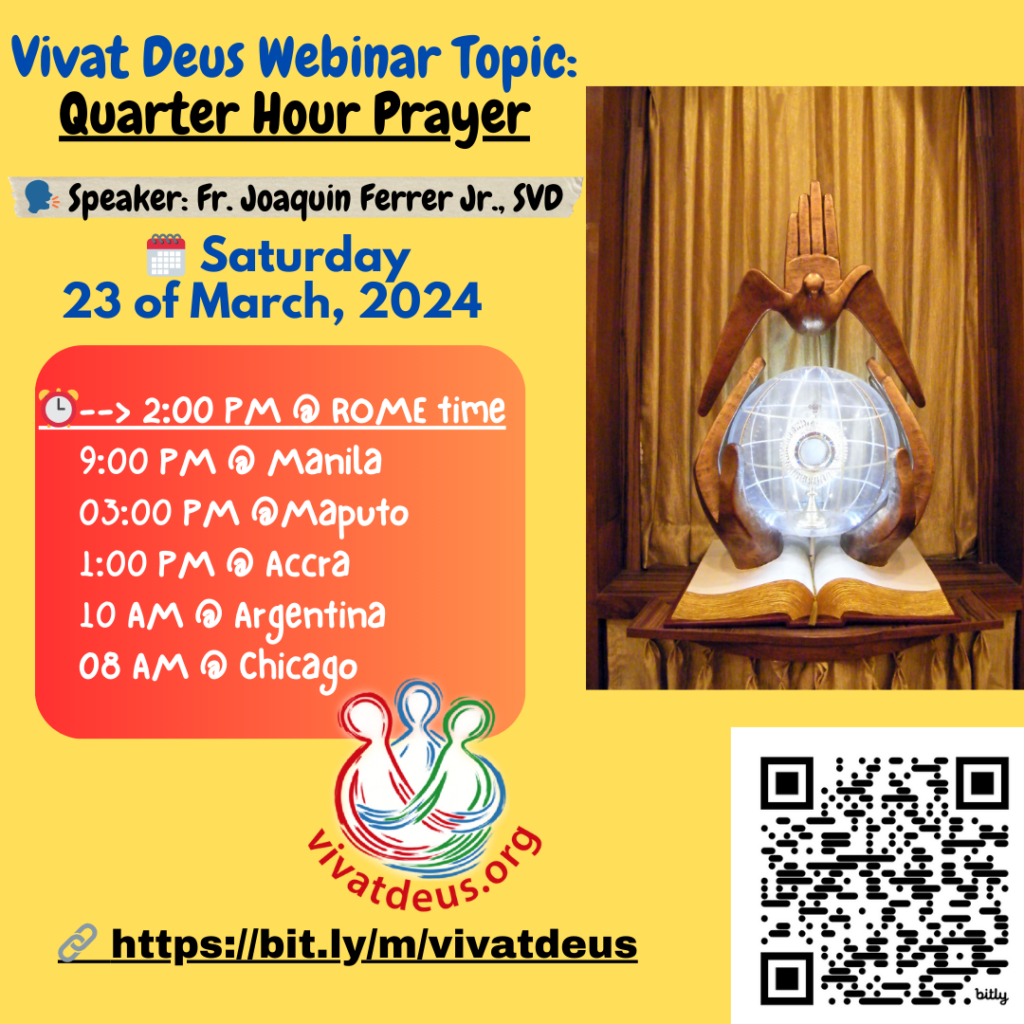
One Response
Thankyou for this.
Very enlightening
God bless you